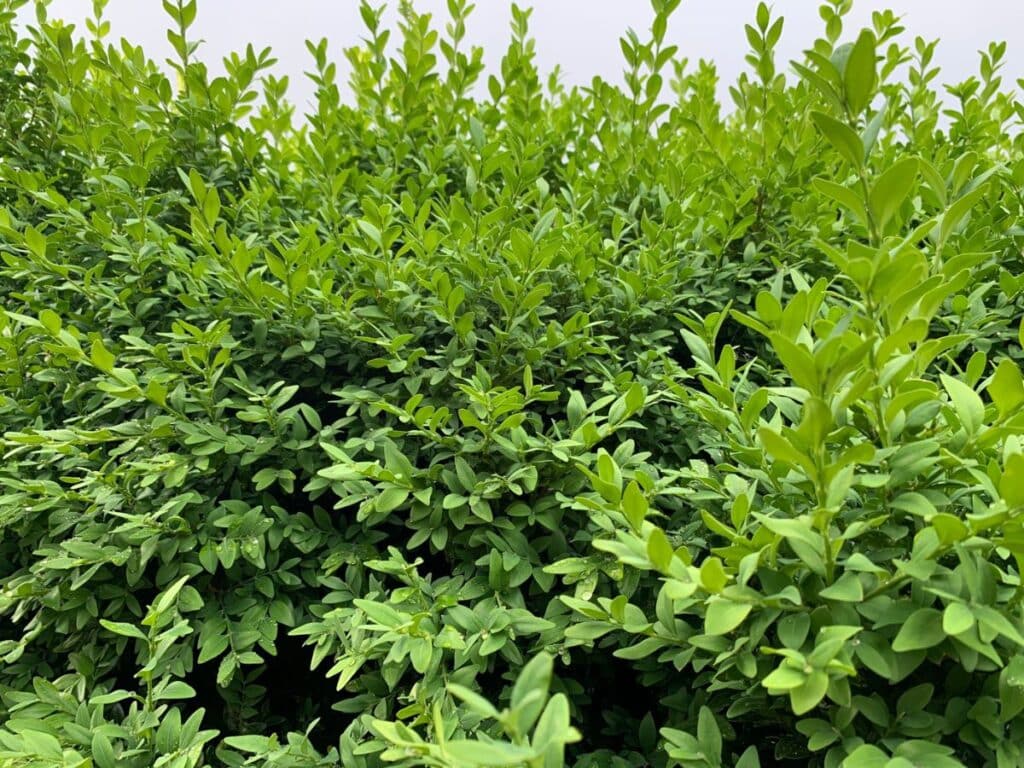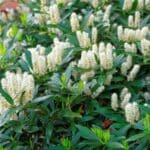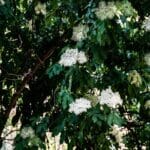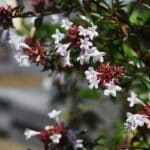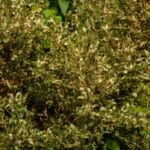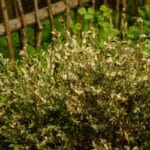Boxwood is a popular choice for landscapers and homeowners alike. It’s an evergreen plant that provides greenery year-round and can be used to create beautiful hedges.
But boxwood isn’t the only option you have when it comes to landscaping your outdoor space.
Let’s explore some boxwood alternatives that will give you all the beauty of boxwoods without all the maintenance and work.
What Can I Plant Instead of Boxwood?
Boxwoods are a popular choice for landscaping, but they’re not the only option available.
There are many other plants that look like boxwood that you can grow to add some greenery to your garden without using boxwood bushes.
Here are some of the most popular boxwood substitutes.
1. Inkberry Holly
Inkberry holly (Ilex glabra) is an excellent boxwood look-alike for creating a formal hedge in your garden, especially if you consider the “Gem Box” variety. It can be grown alone, or combined with other Ilex varieties to create a gorgeous visual effect.
Its low-growing nature and medium texture make Inkberry Holly the perfect hedging choice, and because Ilex plants are evergreen, they provide year-round privacy and beauty.
Ilex Glabra can reach heights of up to three feet in some cases and provides black berries that birds enjoy eating during the winter months. Waxier than traditional boxwood, this Ilex variety grows slowly but surely, making it a durable and worthwhile addition to any garden.
2. Japanese Holly (Ilex crenata)
Japanese holly is another option for shrubs that are similar to boxwood, and is a great choice for gardeners searching for low-maintenance plants that can stay tall and wide with minimal pruning.
This evergreen offers year-round visual interest, attracting pollinators in the spring and providing a thick canopy of branches during the winter to let wildlife find shelter. A variety of sizes of Japanese Holly can fit into most gardens, whether it’s adding a small hedge line or looking to bring definition and texture to large spaces.
Sky Pencil
One alternative to boxwood is Sky Pencil Holly,
which has glossy green leaves and a slim, upright growth habit that resembles a pencil (hence the name). It’s easy to grow and thrives even in full sun, making it a great addition to any garden.
Nana Gracilis
Another option is Nana Gracilis, a dwarf Japanese holly that stays small with tiny but glossy leaves. It’s drought-resistant, deer-resistant, and likes acidic soil, making it an excellent choice for those looking for natural resistance.
3. Pyracomeles
If you’re looking for hedge alternatives to boxwoods in your landscaping, pyracomeles is an excellent choice. A dwarf evergreen shrub, it has shiny dark green leaves that create dense foliage throughout the year.
Also known as ‘pineapple broom’, pyracomeles grows slowly but steadily and develops into a large multi stemmed broadleaf evergreen. While not as common as other varieties of boxwood, this beautiful shrub can take its place within any landscape design with the confidence that it will provide a lovely display year-round.
4. Globe Arborvitae
Boxwood shrubs have long been a staple of landscaping, but with the recent rise of boxwood blight, homeowners are seeking out other options.
Globe arborvitae is an ideal alternative, as it has all of the appealing characteristics of boxwood and is much more resistant to this fungal disease.
The variety can also be conveniently found in many shapes, such as pyramids, globes, and cones — all of which can be used to add interesting texture and color to your garden.
5. Yew
Yews have a slow growth rate but can get quite large if left unchecked. They make great hedges or screens because of their deep green foliage and thick branches that can be trimmed easily into any shape desired.
6. Mirror Bush
This evergreen shrub has shiny leaves and produces fragrant white flowers in springtime. It grows quickly and is easy to maintain, making it a great alternative to boxwood. It also provides coverage from wind and sun due to its dense foliage.
7. Reblooming Azalea
Azaleas are known for their bright colors and beautiful blooms throughout the spring months, making them an excellent addition to any garden with plenty of sun exposure available (at least 4 hours per day).
In addition to their beauty, they’re also relatively easy to care for and don’t require frequent trimming like other plants do in order to maintain their shape and size.
8. Teton Firethorn
This evergreen shrub is native to North America and grows up to 10 feet tall. Its bright green leaves turn orange-red in winter, providing a beautiful contrast against the snow. It prefers full sun exposure but can also tolerate partial shade.
9. Eastern Arborvitae
Eastern Arborvitae is a great alternative to box thanks to its columnar growth habit. Growing both tall and wide, it offers lush foliage that is a deep, rich green color. This makes them ideal for creating a privacy screen in the yard or growing as an ornamental topiary – use your imagination!
Once established, Eastern Arborvitae are tolerant of heat and seasonal fluctuations, making them perfect for all kinds of climates. Incorporating Eastern Arborvitae into your landscaping will give you years of strong interest, beauty, and low-maintenance pleasure.
Another bonus? This replacement for boxwood is also deer resistant!
10. Juniper
Juniper is another popular evergreen shrub with a wide variety of shapes, sizes, and colors available depending on the species you choose. It’s drought-tolerant and requires minimal maintenance once established, making it an ideal choice for anyone looking for an easy-to-care-for and cheap alternative to boxwood shrub.
11. Golden Vicary Privet
This is an excellent choice if you’re searching for something with plenty of color! The golden vicary privet produces tiny yellow flowers during the spring that attract pollinators such as bees and butterflies. It’s also very low maintenance—it only needs trimming once every two years!
12. Anna’s Magic Ball
If you’re looking for something with a bit more pizazz, check out Anna’s Magic Ball. This slow-growing evergreen shrub has a unique, boxwood-like look with small, glossy leaves that stay green year-round. It prefers part shade and is relatively deer-resistant.
13. Thuja Occidentalis
Thuja Occidentalis, or American Arborvitae, is another great alternative to boxwood. It grows faster than boxwood and has a similar look, with green leaves and a natural resistance to pests and diseases. It’s also drought-resistant and can tolerate a variety of soil types.
Are Boxwoods (Buxus Sempervirens) Out of Style?
Growing boxwoods as hedges is a common sight in many gardens. They offer a formal, structured look that can give your garden an elegant touch.
But there are certain times when it is best to forego using boxwood hedges, and understanding these reasons will help you make the right choice for your landscape.
Let’s take a look at some of the most common scenarios when you should consider avoiding boxwoods and replace them with other types of plants.
If There Are Winter Hardiness Issues
Boxwood shrubs are generally hardy plants, but there are some varieties that may not fare so well in colder climates or during severe winters.
If you live in an area where sub-zero temperatures are common, then you may want to consider planting something else instead of boxwoods. This will ensure that your hedge remains intact even if temperatures drop too low for the boxwood variety you’ve chosen.
If There Are Smell Issues
Some varieties of boxwood have a bad odor or are pungently scented, which can be off-putting for those who pass by them frequently.
If this is a concern for you then it might be wise to opt for another type of hedge plant instead.
To Add Biodiversity
While boxwood hedges provide structure and formality to any garden setting, they don’t necessarily add much biodiversity to the space.
If adding more plant species is important to you, then planting other types of hedges such as cotoneaster or yew would be more beneficial than simply opting for a single type of hedge such as the boxwood variety.
To Reduce Pest and Disease Pressure
Boxwoods are susceptible to pests and diseases such as boxwood blight (which spreads through leaf litter and is a fungal pathogen with sticky spores that spread easily).
Boxwood blight first showed up in the US over a decade ago, and it’s been spreading like wildfire ever since. The fungus causes unsightly black spots on leaves, defoliation, and can eventually kill the plant altogether. Plus, it’s incredibly contagious – it can spread through water splashes, pruning tools, even on your clothes or pets.
So if you’re a boxwood lover, you need to be vigilant when it comes to preventing the spread of this nasty disease.
One way to do that is to choose alternatives to boxwood that are less susceptible to the fungus. And there are plenty of options out there that can still give you that formal, rounded shape you love. Inkberry holly, for example, is a great choice – it’s a native plant that’s dark green, likes part shade to full sun, and grows faster than boxwood. Plus, it’s resistant to boxwood blight and can even tolerate salt spray if you live near the coast.
There are plenty of other alternative plants out there too – you just need to do a little research to find the right ones for your garden. And by choosing native alternatives, you’re not only helping prevent the spread of boxwood blight, but you’re also supporting the local ecosystem and providing habitat for birds and insects.
Besides choosing boxwood alternatives, trimming bad or unwanted branches can help keep your boxwood healthy. You can read this guide to learn when to trim boxwoods.
Tips for Choosing the Plants That Are Similar to Boxwood
Whatever your climate is like, there are sure to be several different options that will thrive in that environment.
Consider using flowering shrubs such as rhododendrons or azaleas to brighten up any area you choose. All these plants provide lush greenery while also adding an eye-catching pop of color each season.
For additional help in selecting the right type of plant, speaking with a local landscape specialist is always recommended. Taking the time to find the perfect alternative to Buxus could make all the difference in creating a well-maintained garden that lasts for years.
Because of the similarity of these shrub alternatives, you might find these boxwood companion plants also look great with your selections.
Think “Outside the Boxwood” With These Boxwood Replacements
Let’s face it, boxwood plants are so 2010. While they used to be all the rage in landscaping, new pests and diseases like boxwood blight have made them a risky choice. Don’t fret though, there are plenty of alternatives to boxwood that will have your yard looking just as polished and put-together.
Let’s recap.
First up, we have the evergreen shrubs. These beauties have glossy leaves that add a touch of class to any garden. Look for options like ilex crenata or inkberry holly for some good resistance to disease, and some bright red berries for color. If you live in an area with acidic soil, consider nana gracilis or sky pencil, these guys are drought-resistant and easy to grow.
If you’re looking for something that’ll give you that formal shape you love, try out some of the Japanese holly options. They offer up small leaves, similar to boxwood, and grow faster too. For a low hedge, the thuja occidentalis may be more your style. It’s almost impossible to kill and deer-resistant, which is a bonus if you live in an area with lots of wildlife.
Want to make sure your new plants are disease-resistant? Try preventative fungicides or go with natural resistance. The following plants are great options:
- Rhododendrons and azaleas
- Anna’s magic ball
- Dark green ilex crenata
- Inkberry holly
- Sky pencil
So, the best time to replace boxwood? Right now! Snatch up some of these boxwood-like alternatives and give your garden the upgrade it deserves. And don’t forget to take a trip to your local plant nursery, they’ll have even more suggestions for you.
With so many alternatives available these days, there’s no excuse not to “think outside the boxwood” when it comes time to choose the right shrubs for your outdoor space!
*image by wirestock_creators/depositphotos

